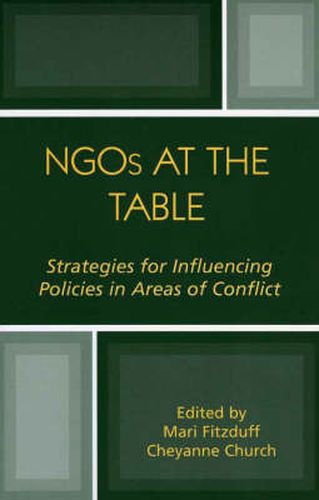Readings Newsletter
Become a Readings Member to make your shopping experience even easier.
Sign in or sign up for free!
You’re not far away from qualifying for FREE standard shipping within Australia
You’ve qualified for FREE standard shipping within Australia
The cart is loading…






The number of NGO’s working in the area of conflict has increased dramatically over the last few decades and they are fast becoming a vital component of both local and international responses to conflicts. As their influence rises, many seek to more effectively impact the policy making and program development of governments and intergovernmental organizations. But how can NGOs do this effectively without sacrificing their own independence and flexibility? NGOs at the Table explores such challenges by examining a number of NGOs, diverse in size, location, and financial means, that have successfully influenced both policy and program development in conflicts throughout the world. It explores why these organizations decided to embark upon a strategic campaign to influence the policy-making process, as well as outlines the issues addressed and the tactics used. It examines the constraints faced in trying to penetrate the governmental process and discusses how these obstacles were overcome. The book also includes analysis and reflections by a variety of experienced policy-makers and academics working in the field. A unique and much- needed resource for NGO’s wishing to extend their own capacities in the field of policy-making, this book will prove valuable for any policy-maker wishing to take advantage of the unique capacities that NGOs contribute to the field of conflict prevention, management, and resolution.
$9.00 standard shipping within Australia
FREE standard shipping within Australia for orders over $100.00
Express & International shipping calculated at checkout
The number of NGO’s working in the area of conflict has increased dramatically over the last few decades and they are fast becoming a vital component of both local and international responses to conflicts. As their influence rises, many seek to more effectively impact the policy making and program development of governments and intergovernmental organizations. But how can NGOs do this effectively without sacrificing their own independence and flexibility? NGOs at the Table explores such challenges by examining a number of NGOs, diverse in size, location, and financial means, that have successfully influenced both policy and program development in conflicts throughout the world. It explores why these organizations decided to embark upon a strategic campaign to influence the policy-making process, as well as outlines the issues addressed and the tactics used. It examines the constraints faced in trying to penetrate the governmental process and discusses how these obstacles were overcome. The book also includes analysis and reflections by a variety of experienced policy-makers and academics working in the field. A unique and much- needed resource for NGO’s wishing to extend their own capacities in the field of policy-making, this book will prove valuable for any policy-maker wishing to take advantage of the unique capacities that NGOs contribute to the field of conflict prevention, management, and resolution.